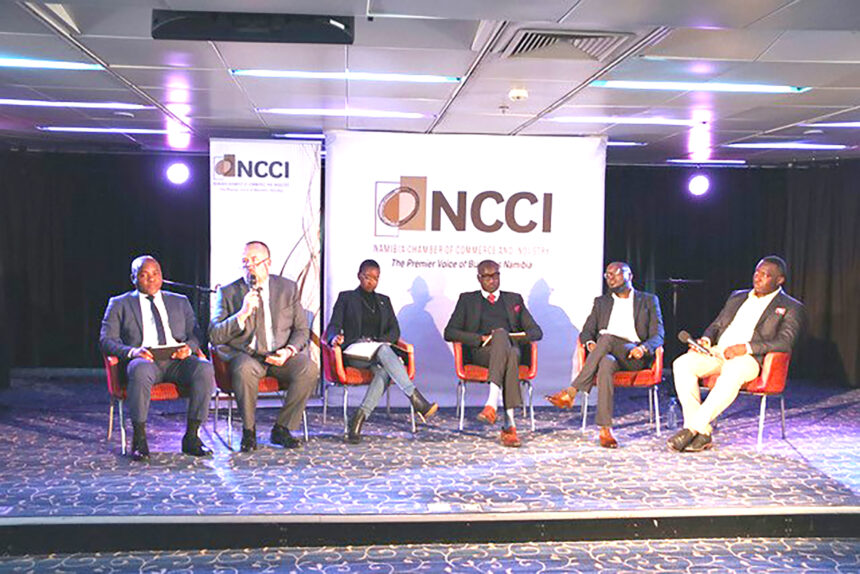A business symposium held at Walvis Bay last week enabled industry leaders and key stakeholders to address challenges and opportunities of Namibia’s promising oil and gas sector.
The symposium was hosted by the Namibia Chamber of Commerce and Industry (NCCI), and took place under the theme “Championing Namibia’s Local Content for Diversity, Inclusion and Sustainable Economic Growth”.
At the event, the managing director of Monasa Advisory & Associates and chairperson of Economic Association of Namibia Jason Kasuto joined a panel discussion, where various topics were unpacked during the full-day interactive engagement.
Commencing on 3 July, the discussions allowed delegates to unpack a variety of topics, including current status and challenges in the domestic oil industry’s operating environment, and proposals for interventions.
Participants touched on numerous topics, such as an introduction to an integrated national local content policy concept note, the prowess of logistics as the transmission belt for connecting industries, economic expansion and sustainable development, as well as creating direct value for Namibians in the Blue Economy.
Focusing on advancing Namibian local content policy interests, input and perspectives, Kasuto joined panellists Maria Mbudhi, chairperson of Public Affairs Committee-NAMPOA; Antoine Berel, vice president for Sub-Saharan Africa at Halliburton; Joao Tiago, SLB country manager, and Knowledge Ipinge, acting managing director at Operatec Maritime and Industrial Training College.
Kasuto shared his thoughts regarding local content policy interests, saying this plays a crucial role in ensuring the exploitation of the country’s natural resources benefits its citizens, and promotes national development.
“It is incumbent on the State to ensure that it manages and regulates the exploitation of these natural resources in a manner that, while being able to attract foreign investment into the sector, it benefits the nation and its citizens.
The local content policy and amendments to the Petroleum Act are among some of the tools that can be applied to give life to Article 100 of the Constitution, which says Sovereign Ownership of Natural Resources below and above the surface of the land and within the territorial waters of Namibia belongs to the State, if they are not otherwise lawfully owned.
Thus, the Constitution recognises State ownership of extractive resources, which suggests that the management, regulation and exploitation of these resources should be conducted in a manner that benefits the nation and its citizens.
Article 99 states that foreign investments shall be encouraged within Namibia. Therefore, it is incumbent on the State to ensure that it manages and regulates the exploitation of these natural resources in a manner that, while being able to attract foreign investment into the sector, the wealth from the natural resources benefits the nation and its citizens.
He further emphasised the importance of the implementation of the local content policy.
“The Local Content Policy (LCP) sets the scene, allowing stakeholders to start alignment. But what’s fundamental is that a targeted strategy is developed to give life to the intent of the policy, and getting the policy out is a necessary catalyst,” he stated.
Halliburton’s Berel added that a local content policy is an important tool for the management of Namibian resources. However, he preferred looking at the issue through the lens of ‘in-country value-creation’, and indicated Halliburton’s commitment to create in-country value for Namibians during their operation.
Mbudhi highlighted the need for government policies and regulations to speak to each other, to make things run smoother for the oil and gas operators.
For example, she noted that oil block licences issued by the mines and energy ministry are not in sync in terms of the length of time, with work permits issued to foreign specialists that need to work on those oil block licences.
Meanwhile, Tiago gave an account of the work SLB is doing to empower the local workforce, sending graduates abroad for training in the oil and gas sector.
As well as their partnerships with local institutions of higher learning, SLB is also making strides in sub-contracting local companies in Namibian operations.
Iipinge disclosed that Operatec, a subsidiary of an Angolan holding company with local shareholding, has passed various international accreditation and audits, and is well-underway to provide much-needed training on the skills required in the sector.



